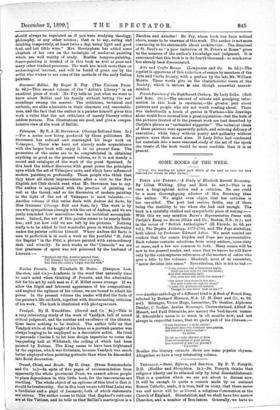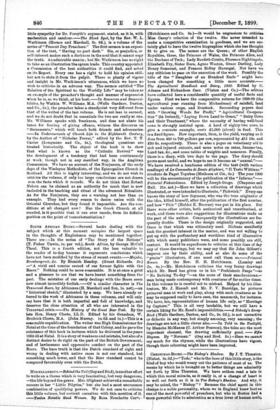THEOLOGY.—Rome, Refo , m, and Reaction. By P. T. Forsyth, D.D.
(Hodder and Stoughton. 5s.)—Dr. Forsyth thinks that religious liberty can be attained only by total disestablishment. That is a question which we are not about to discuss now. It will be enough to quote a remark made by an eminent Roman Catholic, made, it is true, half in irony, that there never was and never will be so liberal a religious Communion as the Church of England. Disestablish, and we shall have two narrow Churches, and a number of free-lances. Generally, we have no little sympathy for Dr. Forsyth's argument, stated, as it is, with moderation and candour.—The Blind Spot, by the Rev. W. L. Watkinson (Horace and Marshall, 35. 6d.), is a volume of the series of "Present Day Preachers." The first sermon is an exposi- tion of the text, "Having no part dark." Sin, or prejudice, or self-interest makes each a darkness in the soul that it cannot espy the truth. An admirable maxim ; but Mr. Watkinson has no right to take as an illustration the opium trade. This country appointed a Commission of the best authorities it could find, and acted on its Report. Every one has a right to hold his opinion still, but not to state it from the pulpit. There is plenty of vigour and insight in Mr. Watkinson's utterances, which we have no wish to criticise in an adverse way. The sermon entitled "The Relation of the Spiritual to the Worldly Life" may be taken as an example of the preacher's thought and manner of expression when he is, as we think, at his best.—In Resources and Resvonsi- bilities, by Watkin W. Williams, M.A. (Wells Gardner, Darton, and Co., 6s.), the preacher takes a standpoint very different from that of the writer of the last volume. He is not less in earnest, and we do not doubt that in essentials the two are really at one. Mr. Williams speaks with frankness, and does not abate his tones for fearing of giving offence, witness the discourse on "Sacraments," which will touch both friends and adversaries- -In Undercurrents of Church Life in the Eighteenth Century, by the Author of "Nicholas Ferrer," edited by the Rev. T. T Carter (Longmane and CO., 5s.), theological questions are treated historically. The object of the book is to show that what is known as the "Catholic Revival" was the development of a tendency that had been continuously at work, though not in any manifest way, in the Anglican Communion. We have an account of the Nonjurors, of the early days of the Wesleyan Methodists, of the Episcopalian Church in Scotland. All this is highly interesting, and we do not wish to 2riticise the volume, if only too large conclusions are not drawn rem the facts which it records. We do not think that Robert Nelson can be claimed as an authority for much that is now included in the teaching and ritual of the advanced Ritualists. As for the Nonjurors, they are a warning not less than an example. They had every reason to desire union with the Oriental Churches, but they found it impossible. Are the con- ditions at all changed now ? Has the Greek Church at all receded, is it possible that it can ever recede, from its definite position on the point of transubstantiation ?























































 Previous page
Previous page